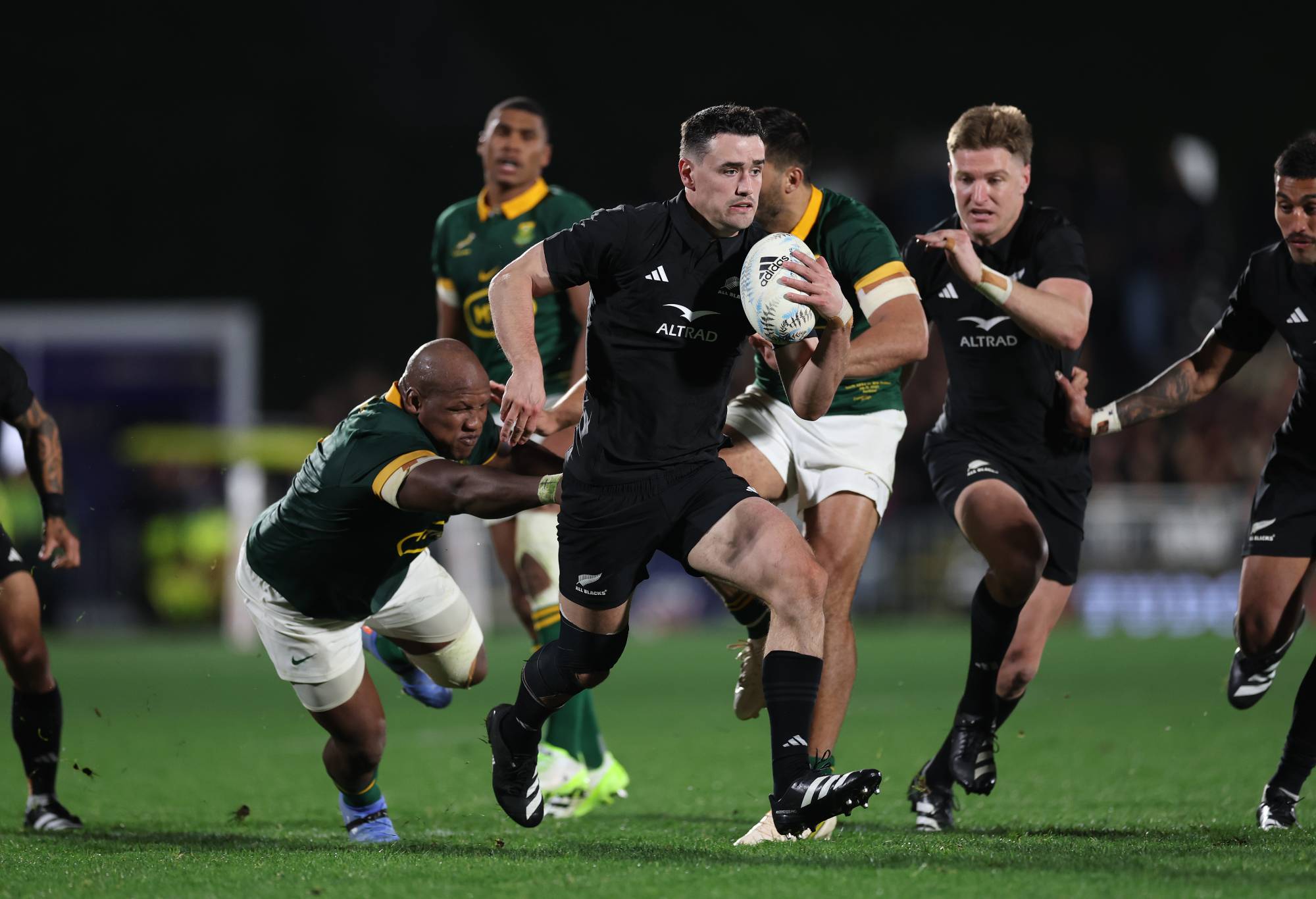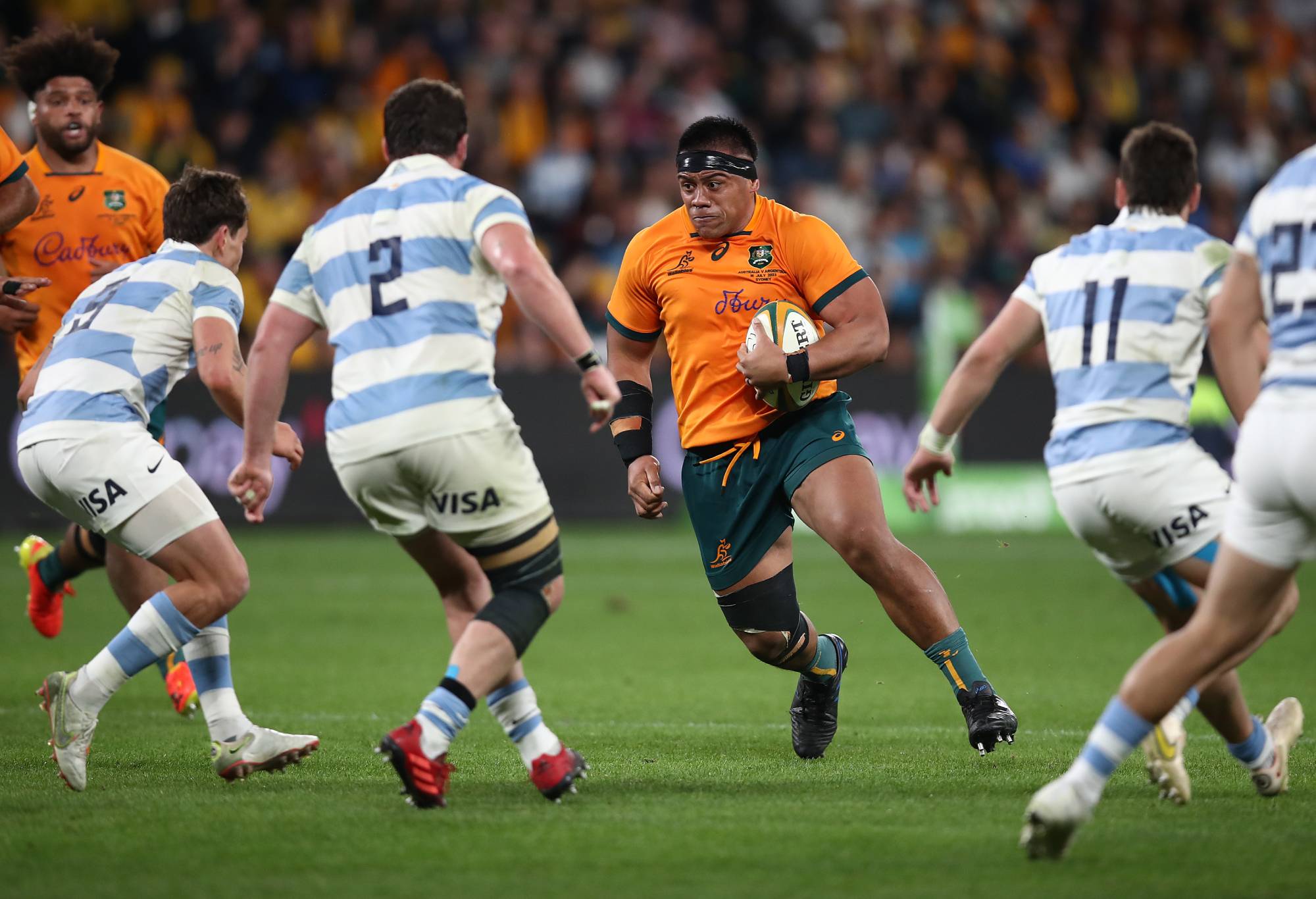One of Test rugby’s endearing characteristics is how heightened levels of intensity and pressure feed into the game’s glorious perfection and imperfections. Both were on display in an epic Rugby Championship weekend, as the All Blacks and Pumas scored contrasting wins over the Springboks and Wallabies, by 35-20 and 34-31 respectively.
As the name implies, Test rugby is hard; not always as hard as the Wallabies are currently making it appear, but with time and space compressed, and physicality ramped up, strange things can and often do, happen.
How often do we see smart players made to look pedestrian, small skill deficiencies exposed and the mental fortitude to stay in the prescribed zone, to maintain self and team discipline, found wanting?
An obvious analogy is the now cliched boxing statement, attributed to Mike Tyson before a fight against Evander Holyfield, where he said “everyone has a plan, until they get punched in the mouth.” That’s Test rugby to a tee.
The statement applies equally to coaches and match officials, and there wouldn’t be two referees in world rugby more illustrative of the organised chaos that so often is Test rugby, than Mathieu Raynal and Jaco Peyper.
Both were in typical form; imperfect and inconsistent, communications always a lottery where Raynal is concerned, and Peyper hampered in his communication by stuttering technology.
But anyone looking for perfection in such a pressure cooker, with the All Blacks playing at breakneck pace, the Springboks after halftime flooding the breakdown like men possessed, the Pumas pushing the niggle meter, and the Wallabies prone to infringement at the drop of a hat, simply doesn’t understand Test rugby.
That’s no excuse for Peyper refusing to pay out on Pablo Matera for his dog shot on Nic White, nor Raynal tormenting Australian viewers by at one point exclaiming “we play”, but for the most part, the big decisions were nailed, and that’s what matters.
Likewise, the coaches; Ian Foster, on a most unlikely journey from zero to hero; Jacques Neinaber, striving to assert his identity; Michael Cheika, tapping into the Argentinian temperament; and Eddie Jones, desperate to convert his stuttering Datsun 1200 into a Porsche.
Great sport doesn’t have to be perfect. Great sport is theatrical, brave, exhilarating, ugly and heartbreaking. And the more that it is all of those things at once, like it was this weekend, the better.
The All Blacks have started Test matches better – the 1995 World Cup semi-final against England, and the epic 39-35 win against Australia in Sydney, in 2000 come to mind – but not many.
It wasn’t just the 17 points in 17 minutes, but the ferocious pace of their play, the blend of physical confrontation, fast recycle and movement of the ball into space, contestable kicking and the willingness to demand the Springboks play out of their comfort zone that impressed.
Indicative was how the Boks handled the All Blacks’ exit following Shannon Frizell’s storming try; slave to the All Blacks’ tempo, taking a quick throw-in and botching it, instead of drawing a deep breath, going to their set-piece and playing the game at their own pace.
Frizell and Will Jordan won most of the plaudits, and deservedly so, but it was difficult to look past the contribution of Brodie Retallick as key; confrontational and direct, with deft, skilful touches as a support and link man.

Will Jordan of New Zealand makes a break during The Rugby Championship match between the New Zealand All Blacks and South Africa Springboks. (Photo by Phil Walter/Getty Images)
Frizell’s try threw up a curly question; was he channelling Jonah Lomu or Jerome Kaino? One imagines NZ Rugby and Silver Lake’s lawyers wasted no time diving into Frizell’s 2024 contract with Toshiba, scrambling to find an exit clause; after all, All Black fans have been waiting a long time for someone to establish themselves as Kaino’s replacement. Finally finding their man and losing him almost immediately, would seem indecently cruel.
As close to perfection as their opening was, it was the All Blacks’ reaction when things got curly after half-time, that would have pleased Foster the most. Here was a period of intense physical assault at the breakdown, the lightning quick front-foot ball of the opening quarter replaced by scrambly scraps, allowing the Boks’ defensive line to rush forward and fill the pressure zones.
But as ragged as the All Blacks looked – and as uncomfortable as they must have felt with the score-line closing to 23-15 – the rubber band never snapped. It was here Sam Cane’s presence was missed, as the vaunted Springbok bench upped the ante, but it was another senior player, Beauden Barrett, who calmly identified space, landing it perfectly for Jordan to score, that made things safe.
While nobody wants to lose a Test match, and certainly not one leading into a World Cup, that’s another great thing about Test rugby; it doesn’t take long before you get another chance to test yourself.
For the Boks, this one feels a lot like their 2019 pool loss to the All Blacks in Japan; a timely opportunity to focus on a couple of weaknesses and reinforce the side’s own DNA, serving as a reminder as to what makes this team such an imposing threat.
All of the essential building blocks remain in place; a rock-solid scrum, an embarrassment of big-man riches, the zip of Faf Du Plessis and Damian de Allende, the finishing skill of Cheslin Kolbe and the silky-smooth left boot of Willie le Roux.
Their inability to absorb pressure in the opening 20 minutes might have cost them in this match, but their ability to apply pressure remains a key strength.
The Wallabies found this out to their detriment last week, and while there were areas of improvement against the Pumas, it was their inability to apply enough pressure on the visitors, for long enough periods, that contributed to this defeat.
wallabies

(Photo by Jason McCawley/Getty Images)
The statistics tell the story; operating at 1/3 possession last week against the Boks, things barely improved here; the Wallabies edging up to 38% versus the Puma’s 62%.
That’s not necessarily terminal, if the game plan is to squeeze the opponent, to pick the off at the breakdown, or force them into error in their defensive half. But without sufficient suffocation, all such a possession deficit does is create other pressure points, with respect to territory, tackle count and energy expended.
While 79 carries by the Wallabies was an improvement on last week, the Puma’s making 151 in return asked a lot of questions of themselves.
Note how the Wallabies completed just 102 passes in the match. To place that in perspective, the All Blacks, in the 3 mins 10 seconds of continuous play that led to Aaron Smith’s opening try, made 36 passes; more than one third of the Wallabies match total in just a single passage of play.
The point isn’t that the Wallabies need to emulate the All Blacks – or anyone else for that matter – but that they must ask harder questions of their opposition, and do that by sustaining pressure on them for far longer.
Instead, the Wallabies fell foul, too often, of the same skill and discipline errors that have marked their play for far too long now. Even after the excellent Mark Nawaqanitawase threatened to win the match off his own hand, they couldn’t find the composure necessary to close matters out.
Quade Cooper’s high contact and Samu Kerevi’s late tackle were both marginal, but with only a minute or so to hold out for the match, to offer the match officials two reasons to hand the visitors a final opportunity to win it, was inexcusable.
Even then, Juan Martin Gonzales’ final wriggle for the try-line was hardly rugby perfection, but it was the outcome that mattered, for a team that, if they can overcome their weakness at 8 v 7-man scrums, is slowly beginning to believe in itself, under Cheika.
So, while more gloom descends upon Australian rugby, and no man, sane or insane, believes the Bledisloe Cup is going anywhere for yet another year, there are some small straws for fans to clutch at.
Players like Kerevi, Rob Leota, Angus Bell, Pone Fa’amausili and Matt Philip have played little rugby in the last year, let alone together. Add a returning Taniela Tupou to that list, throw in the time needed for new coaches and players to get to understand each other, and it is reasonable to expect improvement.
How much improvement is a much tougher question to answer. Perfection, it seems, is out of the question. But the Wallabies limiting their imperfections, learning how to play through those moments, absorbing pressure without losing their discipline, and transferring that pressure onto their opponent, is a must.
There was imperfection in the broadcasting ranks too, with a Stan half-time panel framed as live, showcasing the uncanny ability of Justin Marshall to be present in a Sydney studio and Auckland’s Mt Smart Stadium at the same time.
But if we thought Marshall was everywhere at once, what about the effort of the Springboks’ Makazole Mapimpi, identified by Sky Sport’s lead commentator Grant Nisbett as playing on the wing, centres and flyhalf for the Boks, simultaneously.
Make no mistake, anyone who covers sport, makes errors identifying players or events. It’s an occupational hazard which inevitably rears its head, but one that hopefully, can be kept to a minimum, and sometimes even, generate a few laughs. Nisbett too, has enjoyed a fine career, would have intended no malice, and is certainly entitled to a few bloopers.
But there was nothing funny about his persistent tagging of a number of the Boks’ black and coloured players, Mapimpi, sometimes in the same passage of play. Throw in his miscalling a number of the All Blacks’ Maori and Polynesian players in the match, and it is evident that father time has well and truly claimed its man.
Perhaps arrangements are in place for Nisbett to stand down at the completion of this year’s World Cup? On the evidence of this call, viewers deserve to have that moment brought forward.






























































































